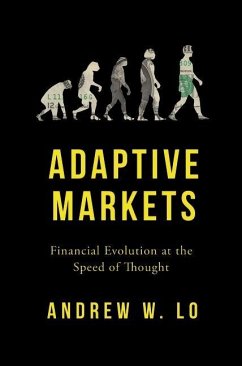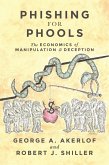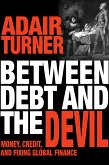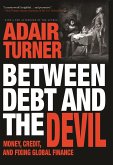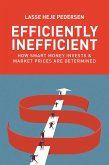Half of all Americans have money in the stock market, yet economists can't agree on whether investors and markets are rational and efficient, as modern financial theory assumes, or irrational and inefficient, as behavioral economists believe-and as financial bubbles, crashes, and crises suggest. This is one of the biggest debates in economics and the value or futility of investment management and financial regulation hang on the outcome. In this groundbreaking book, Andrew Lo cuts through this debate with a new framework, the Adaptive Markets Hypothesis, in which rationality and irrationality coexist.
Drawing on psychology, evolutionary biology, neuroscience, artificial intelligence, and other fields, Adaptive Markets shows that the theory of market efficiency isn't wrong but merely incomplete. When markets are unstable, investors react instinctively, creating inefficiencies for others to exploit. Lo's new paradigm explains how financial evolution shapes behavior and markets at the speed of thought-a fact revealed by swings between stability and crisis, profit and loss, and innovation and regulation.
A fascinating intellectual journey filled with compelling stories, Adaptive Markets starts with the origins of market efficiency and its failures, turns to the foundations of investor behavior, and concludes with practical implications-including how hedge funds have become the Galápagos Islands of finance, what really happened in the 2008 meltdown, and how we might avoid future crises.
An ambitious new answer to fundamental questions in economics, Adaptive Markets is essential reading for anyone who wants to know how markets really work.
Dieser Download kann aus rechtlichen Gründen nur mit Rechnungsadresse in A, B, BG, CY, CZ, D, DK, EW, E, FIN, F, GR, HR, H, IRL, I, LT, L, LR, M, NL, PL, P, R, S, SLO, SK ausgeliefert werden.

Anleger sind weder rational noch irrational
"Angst ist eine wunderbare Sache", schreibt der amerikanische Ökonom Andrew W. Lo. "Unsere Angst ist ein Präzisionsinstrument." Angst hilft Menschen seit dem Beginn der Evolution, gefährliche Situationen zu erkennen und dann zwischen Kampf und Flucht zu entscheiden. Die Tatsache, dass Menschen Angst empfinden, hilft ihnen in vielen Lebenslagen, aber sie bedeutet auch, dass die in den modernen Wirtschaftswissenschaften verbreitete Vorstellung stets effizienter Finanzmärkte, an denen sich stets rationale Teilnehmer tummeln, mit der Realität nicht vereinbar ist.
Lo will das Kind nicht mit dem Bade ausschütten und die Vorstellung effizienter Finanzmärkte verdammen. Er will das Bild des rationalen Anlegers ergänzen, indem er den Anleger als lernenden Menschen beschreibt. Der lernende Mensch im Wirtschaftsleben ist keine gänzlich neue Idee, aber sie verdient größere Beachtung. Wie Lo die Vorgänge an den Finanzmärkten mit Hilfe lernender Menschen erklärt, ist nicht nur lehrreich, sondern in Teilen auch amüsant.
gb.
Andrew W. Lo: Adaptive Markets. Financial Evolution at the Speed of Thought. Princeton University Press. Princeton 2017. 484 Seiten. 37,50 Dollar.
Alle Rechte vorbehalten. © F.A.Z. GmbH, Frankfurt am Main

